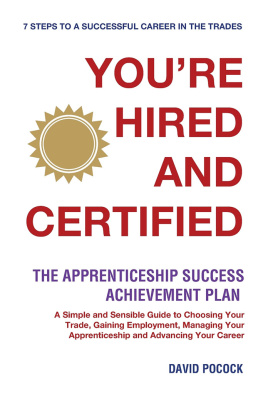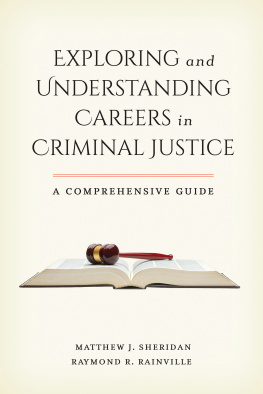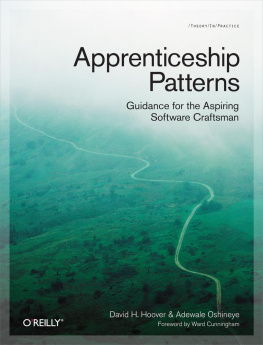About the Author
Dave Pocock loves all things Trade! Dave graduated with a university business degree but his real passion was working with and learning from a vast variety of people in the Trade industry. Dave has considerable hands on experience as a general home building Contractor.
Dave thrives when he can help others excel in their chosen Trade as he knows what it takes to be successful. Dave created the 7 Step Plan to guide anyone wanting to build a career as a Certified Journeyperson.
Dave authored his first book called A Complete Guide to Being Your Own Home Contractor, in 1984, has 3 adult children and 1 tolerant wife.
Published by: David Pocock, October 2021
Copyright 2020 by David Pocock, all rights reserved
No part of this publication may be reproduced, stored in a retrieval system, or transmitted, in any form or by any means, electronic, mechanical, photocopying, recording, or otherwise, without the prior written permission of the publisher.
Registration 1178844 February 19, 2021
Edited by: Deb OGrady
ISBN: 978-1-7772683-2-9 (hardcopy)
ISBN: 978-1-7772683-3-6 (ebk)
This book is fondly dedicated to my three children:
Matthew Pocock, RSE
Certified Journeyman Tile Setter
Lindsay Little, B.A., M.C.
Registered Psychologist
Ryan Pocock
Certified Journeyman Communications Technician
Thank you to my family and friends for all your positive encouragement.
Introduction
Our lives depend on Tradespeople. Tradespeople are the builders of our society and the creators of the lifestyle we all enjoy today.
Tradespeople are vital and essential to the world economy and the rewards of being Certified are numerous and plentiful. The skills and talents of Tradespeople are seen everyday in the homes we live in, the buildings we work in, the sports facilities we enjoy, the infrastructure we use daily, the food we enjoy and personal care services. This is just a small example of the far-reaching talent of a Tradespersons contribution to our culture and community.
Youre Hired and Certified explains the Trades, the process and opportunities of obtaining a Journeyperson Certificate in seven easy steps. It covers everything from selecting a Trade, to gaining employment, managing the Apprenticeship and advancing your career after Certification. The steps, practical lists and action exercises make this book a useful tool for anyone at all interested in learning more about the Trade industry.
Apprenticeship training, Apprenticeship contracts and Certification can vary depending on location, industry and governments. Information in Youre Hired and Certified has been written to support all Trades and stakeholders dealing with the employment, training and Certification of Tradespeople.
Congratulations on taking the first step to achieving a successful lifetime career in the Trades.

Who Should Read this Book?
For those who have reached this point in the book, this book is for you!
Determining a career path can be a somewhat daunting and confusing experience.
Perhaps you are a student or someone looking to change jobs and is considering a Trade as a valuable and rewarding career option. Perhaps you are a career advisor such as a teacher or family member and are assisting someone needing to learn more about the Trade industry. Perhaps you are an employer that recognizes the importance of training and development of employees. Or perhaps, youre a new Apprentice and want to learn more about managing your Apprenticeship.
Trades offer great careers and they also become steppingstones for advancement when additional education, work experience and confidence are gained.
This book will help all of you move forward using the 7 Steps of the Apprenticeship Success Achievement Plan.
Table of Contents
Part 1 - Lets Talk Apprenticeship and Trade
What is an Apprenticeship?
An Apprenticeship is an education program that is a combination of on-the-job training provided by an employer and the applicable technical training specific to the Trade.
The training provided on the job is gained by working with someone whom is already Certified in the Trade, is qualified by experience or is nearing the completion of the Apprenticeship Program such as a 4th year Apprentice training a 1st year Apprentice. Government or an industry organization typically provides the technical training.
Where are Apprenticeships Offered?
Apprenticeships are offered in most countries around the world. Trades offered will vary in different areas based on the need determined by governments and industry.
Training institutions will develop course material based on the determined need and administer the Trade programs accordingly. These institutions work closely with governments and industry to manage Apprenticeship training and certification and all of the associated tasks.
The formal classroom-training component of an Apprenticeship program is typically offered in high demand locations, such as regions where those industries exist or cities where there is a training institute or provider offering the program.
Our world is ever changing, as is the demand for various Trades.
What is a Trade?
Trades are occupations that offer a Certificate following completion of an Apprenticeship program involving technical training, on-the-job work experience and examinations. Trades are designated a Trade status by governments and industry associations where the need for skilled Tradespeople is supported by industries in the area. As such, they are usually regulated by legislation or governed by a standards organization.
What are Trade Classifications?
A Trade or Trade work may be classified as compulsory or restricted, which means Certification is necessary to perform tasks in the Trade. Some examples are:
Structural safety work
Mechanical safety work
Fire risk safety
Gas safety
Other public health or safety work determined by Industry
Professional standards established by Industry
Public safety is one reason some Trade activities may be restricted to individuals who have proven to be qualified to perform the tasks.
Trades could be classified as optional Certification allowing work to be performed without any mandatory requirements of a Certificate. However, safety regulations may exist regardless of the classification of the Trade.
What Industries are Trades in?
There is such a wide range of industries requiring Trades, which makes it such an exciting career choice. Trades people work in a vast array of work environments in almost every sector of our economy.
Tradespeople are also involved in many business areas from management, to entrepreneurship opportunities as well as members in executive positions.
Trade School or University?
There are advantages for career advancement from the pursuit and completion of either a Trade Certificate or University Degree.
The choice is really yours and they both can offer successful and achievable careers. Its all about what is right for you.
A Trade Certificate can be achieved for far less cost than a University Degree as the Apprentice is often paid while in training. Tuition fees are much less and are often covered by employers and some unions and associations provide tuition reimbursement. Government grants, scholarships and bursaries also often exist for Apprentices.









